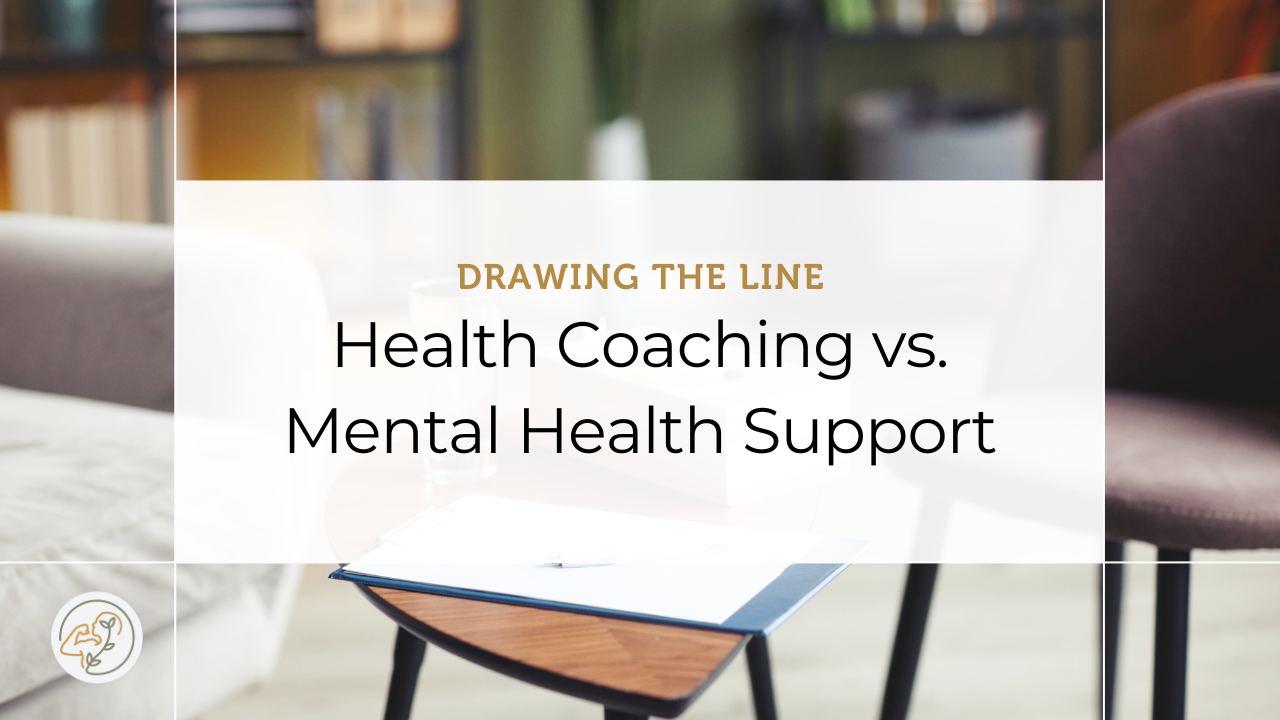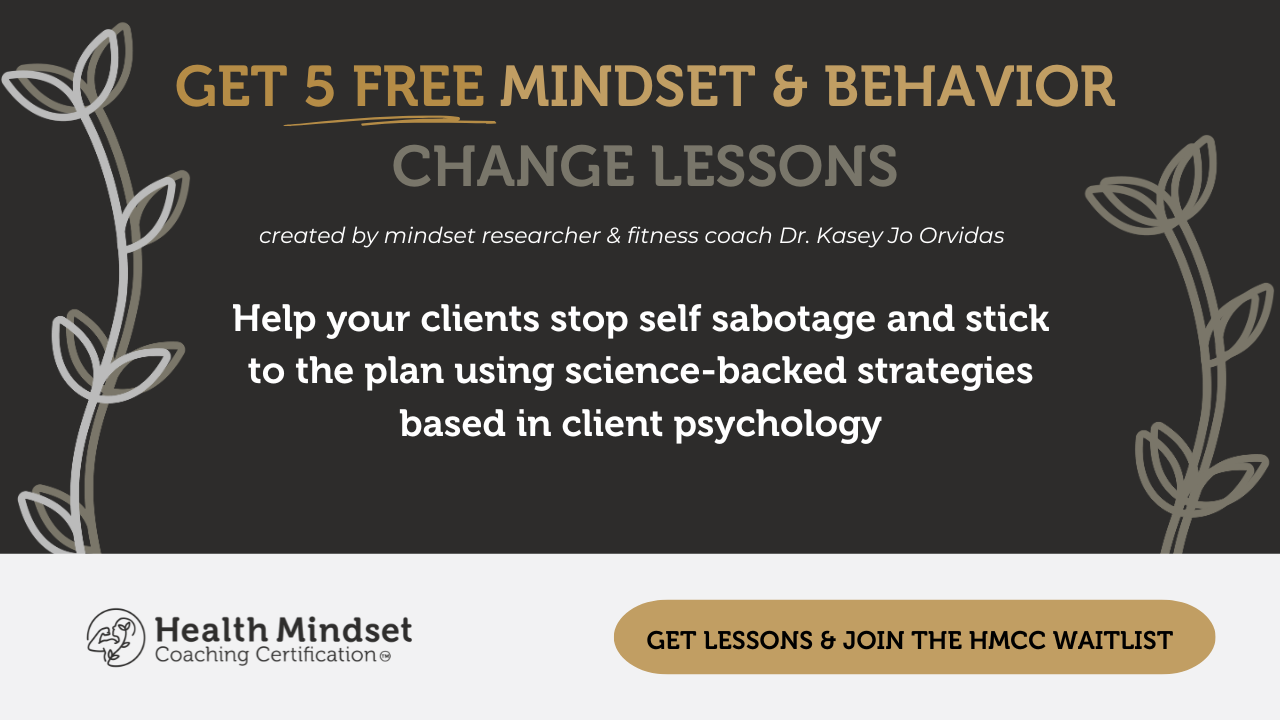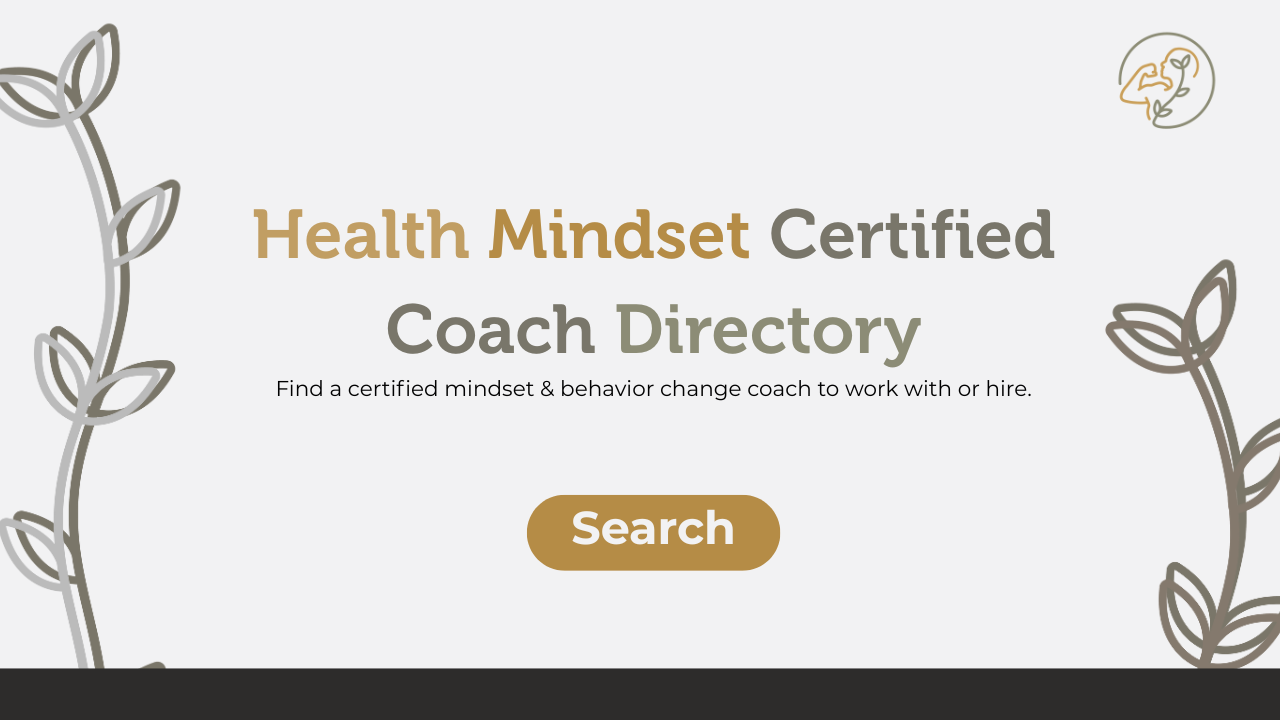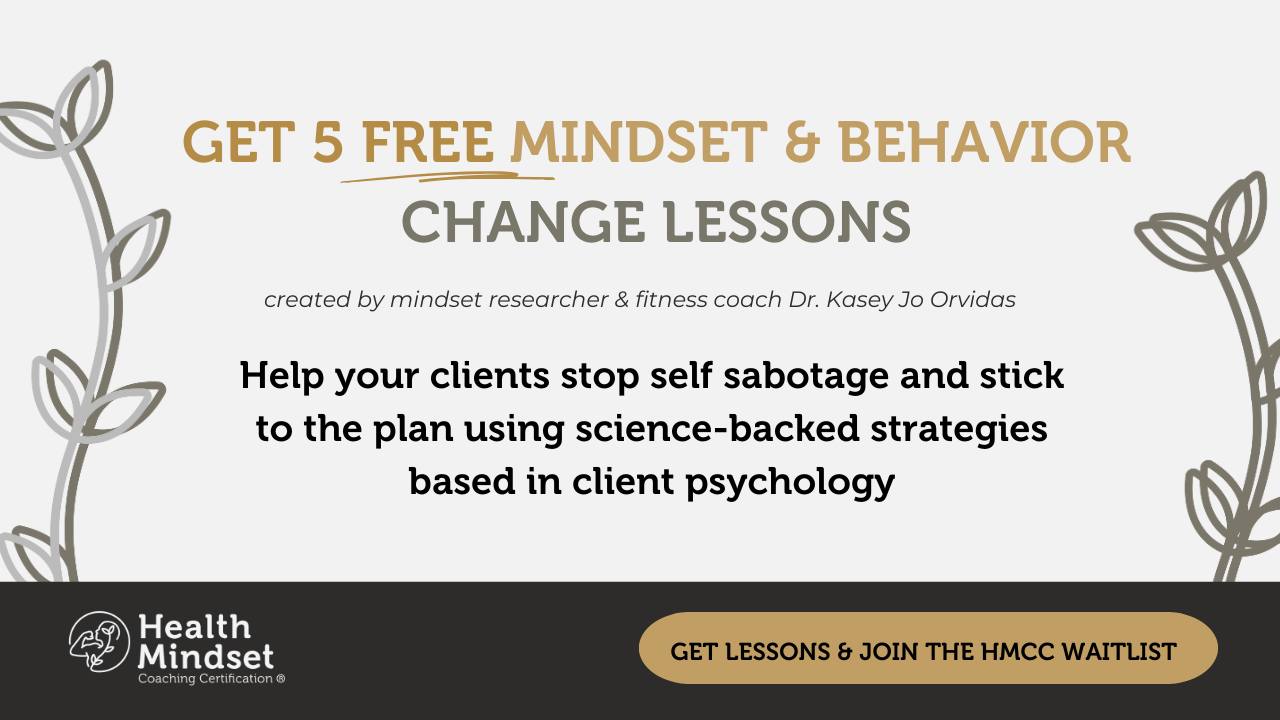Psychology in Fitness Coaching: What Every Coach Needs to Know
Sep 19, 2025
When most people think of health and fitness coaching, they picture training programs, meal plans, and maybe some accountability check-ins. But if you've been a coach for any length of time, you know the reality: success in health and fitness isn't just about macros and workouts.
The real challenge is behavior change.
Why do some clients consistently stick to your plan while others self-sabotage after a week?
Why do some thrive in the face of setbacks, while others spiral into frustration and guilt?
The answer often lies in psychology in fitness coaching. And as a coach, understanding how to integrate psychology into your work can mean the difference between temporary results and lasting transformation.
Table of Contents
Why Psychology Matters in Fitness Coaching
The Scope of Practice: What Health Coaches Can and Cannot Do
When to Refer Clients to a Mental Health Professional
Obsessive Thoughts About Body Image or Food
Extreme or Disordered Eating Behaviors
Severe Emotional Distress
Impact on Relationships and Work
Trauma Disclosure
How to Have the Referral Conversation
1. Lead With Care and Empathy
2. Normalize Professional Support
3. Use Scope of Practice as a Boundary
4. Offer Resources and Referrals
5. Keep the Door Open
How Coaches Can Use Psychology in Fitness Coaching
Motivational Interviewing (MI)
Values Exploration
Adopting a Growth Mindset
Identity-Based Habits
Self-Compassion Practices
Start Using Psychology in Your Coaching Practice
Connect with us!

Why Psychology Matters in Fitness Coaching
Most clients already know the basics: eat more whole foods, move more, sleep better. Lack of information isn't usually the barrier.
Instead, the psychological hurdles like self-sabotage, all-or-nothing thinking, low motivation, and negative self-talk block consistent action.
That's where psychology comes in.
Applying psychological principles like mindset, behavior change strategies, and motivational science allows you to help clients break through barriers that workouts and meal plans alone can't fix.
As it happens, this stuff is EXACTLY what I teach in the Health Mindset Coaching Certification, so health coaches can actually help clients make long-term changes by addressing mindset and behavior change.

The Scope of Practice: What Health Coaches Can and Cannot Do
Before diving deeper, let's draw a clear boundary.
As coaches, we are not therapists. We are not here to diagnose eating disorders, treat trauma, or handle clinical mental health conditions.
The line between coaching and therapy is crucial.
Coaches support behavior change within the context of fitness and health. Therapists treat mental health disorders and clinical concerns.
Failing to recognize this boundary can put your clients at risk and put you outside your scope of practice.
But staying within your lane doesn't mean ignoring mindset or behavior change. It means learning to use psychology tools appropriately and knowing when to refer out.
I strongly recommend you create some connections with mental health professionals, so you can refer your clients to someone you know and trust. You can refer to the HMCC graduate directory here if you'd like to connect with someone who has completed the Health Mindset Coaching Certification.
And if you're interested in helping clients with mindset and behavior change, you can get started with these 5 FREE lessons on mindset and behavior change.
When to Refer Clients to a Mental Health Professional
Knowing your limits is one of the most important parts of using psychology in fitness coaching.
As health coaches, we want to help our clients as much as possible, but crossing into clinical territory can do more harm than good. Recognizing when to refer out is not a weakness. It's professionalism.
Here are some clear signs that it's time to encourage your client to seek support from a licensed mental health professional:
Obsessive Thoughts About Body Image or Food
If a client is thinking about their weight, food choices, or appearance all day long to the point that it interferes with their focus or mood, this may be a sign of disordered eating or body image concerns that go beyond coaching.
Extreme or Disordered Eating Behaviors
Things like binge eating, purging, compulsive dieting, or restrictive eating patterns are red flags. While coaches can support balanced nutrition habits, disordered eating requires specialized clinical care.
You can check out this blog post about the difference between binge eating and overeating if you aren't sure which category your client falls under.
Severe Emotional Distress
If clients express persistent feelings of depression, hopelessness, or anxiety that impact their day-to-day life, this is a sign they need professional mental health support in addition to your coaching.
Impact on Relationships and Work
Ask gentle questions like: "How often do you think about this during the day?" or "Is this affecting your relationships or productivity?" If the answer is yes, the issue has likely reached a level where therapy is necessary.
Trauma Disclosure
If a client begins sharing past trauma or abuse, this is outside the scope of fitness coaching. Referring them to a therapist ensures they get the care they need while allowing you to stay within ethical boundaries.
A helpful rule of thumb: if what your client is experiencing is persistent, pervasive, and interfering with their daily functioning, it's time to refer out.
That doesn't mean you stop being their coach.
In fact, many clients benefit from having both a fitness coach and a therapist. You can continue supporting them with behavior change strategies, accountability, and lifestyle habits, while the mental health professional addresses the clinical concerns.
By confidently drawing this line, you protect your client, your coaching practice, and your credibility.
How to Have the Referral Conversation
Referring a client to a mental health professional can feel intimidating. You might worry about offending them, losing their trust, or making them feel judged.
But a referral can actually strengthen your relationship and show your client that you truly have their best interests at heart when you handle it with care.
Here are some tips to make the conversation supportive and professional:
1. Lead With Care and Empathy
Start by affirming what your client is doing well and has achieved with you. Then acknowledge the challenge they've shared:
- "I can see how much effort you're putting into this, and it sounds like it's been really tough to manage these thoughts on your own."
This sets the tone that you're on their side, not pointing out flaws.
2. Normalize Professional Support
Frame therapy as an additional resource, not a replacement for coaching:
- "Many people benefit from working with both a coach and a therapist. I can continue to help you with your fitness and habit goals, while a therapist can give you specialized support in the areas that go deeper than coaching."
This reinforces that your coaching is still valuable and ongoing.
3. Use Scope of Practice as a Boundary
Be transparent about your role and expertise:
- "My role as your coach is to help you with mindset strategies, consistency, and behavior change. But when it comes to things like persistent anxiety or disordered eating patterns, that's where a licensed therapist can give you the best support."
This shows professionalism and protects both you and your client.
4. Offer Resources and Referrals
If possible, provide recommendations or offer to connect them with trusted professionals in your network. This takes the burden off the client to figure it out alone.
5. Keep the Door Open
Let them know that seeking therapy doesn't mean ending your coaching relationship:
- "I'll still be here to support you with your health and fitness goals. Having another professional on your team just means you'll have even more support."
By handling referrals with empathy, clarity, and reassurance, you create a safe environment where your clients feel cared for, not dismissed.
This is the heart of integrating psychology into fitness coaching: knowing when to guide, when to support, and when to bring in other professionals.

How Coaches Can Use Psychology in Fitness Coaching
While coaches should never attempt to act as therapists, there's a wide range of psychology-based tools you can safely and effectively use in your practice.
In fact, this is where coaching has the potential to move from surface-level habit tracking to true transformation, and it's why I created the Health Mindset Coaching Certification, which teaches you how to use psychology to help your clients achieve true behavior change.
Here are a few examples of what falls within scope for fitness professionals:
Motivational Interviewing (MI)
Instead of telling clients what to do, motivational interviewing teaches you to ask powerful, open-ended questions that help clients uncover their own reasons for change. This not only boosts buy-in but also builds lasting motivation.
I have a free motivational interviewing cheat sheet you can use here!
Values Exploration
Helping clients identify what matters most to them (family, energy, confidence, independence) connects their daily health choices to a bigger "why."
Research shows that clients stick with behaviors longer when they align with their values.
Adopting a Growth Mindset
Many clients struggle with all-or-nothing thinking, perfectionism, or self-sabotage. Teaching them to reframe setbacks (e.g., going from "I had a bad meal" to "I had one meal that didn't align, but the day isn't ruined.”) helps break negative cycles and strengthens resilience.
Identity-Based Habits
Psychology in fitness coaching means helping clients shift from outcome-focused goals ("I want to lose 15 pounds") to identity-driven ones ("I'm the type of person who moves my body daily").
This mindset shift is key for consistency and long-term success.
Self-Compassion Practices
Coaches can encourage clients to replace shame and guilt with curiosity and kindness. This doesn't mean letting clients "off the hook." It means supporting sustainable change by helping them bounce back instead of giving up.
These tools don't require you to diagnose or treat mental health conditions. They're strategies that stay firmly in the coaching lane while still addressing the psychological barriers that often hold clients back.
Start Using Psychology in Your Coaching Practice
You give your clients something much better than a workout plan or meal guide when you integrate psychology into health coaching.
You help them develop the mindset and skills they need to maintain their results for life.
At the end of the day, fitness coaching that ignores psychology is incomplete.
Clients don't just need a plan. They need a mindset shift that helps them create behavior change. They need strategies to stay consistent, navigate self-sabotage, and align their habits with their values.
As a coach, you don't need to be a therapist, but you do need to understand how psychology impacts behavior, and how to apply it in your coaching practice — while knowing where your scope ends.
This is exactly why psychology in fitness coaching isn't "woo woo." It's science. And it's the missing piece for most clients who already know what to do but can't seem to do it consistently.
Want to learn how to apply psychology in your coaching practice without crossing into therapy?
Start with our 5 FREE Mindset Lessons to help you tackle all-or-nothing and fixed mindset thinking, stop the self-sabotage that keeps your clients from succeeding, help them develop more self-control, and increase motivation and follow-through.
And if you want more on this topic, you should check out this episode of the Not Another Mindset Show podcast!
I talk about how, as a fitness coach, you might often feel like a therapist, but you aren't. And this line is an important one to NOT cross.
I share where the line is between fitness coaches supporting mindset and mental health, and when they need to refer a client out for mental health counseling. Remember, using psychology principles and mindset strategies in your fitness coaching practice is NOT the same as counseling.
Connect with us!
Email: [email protected]






